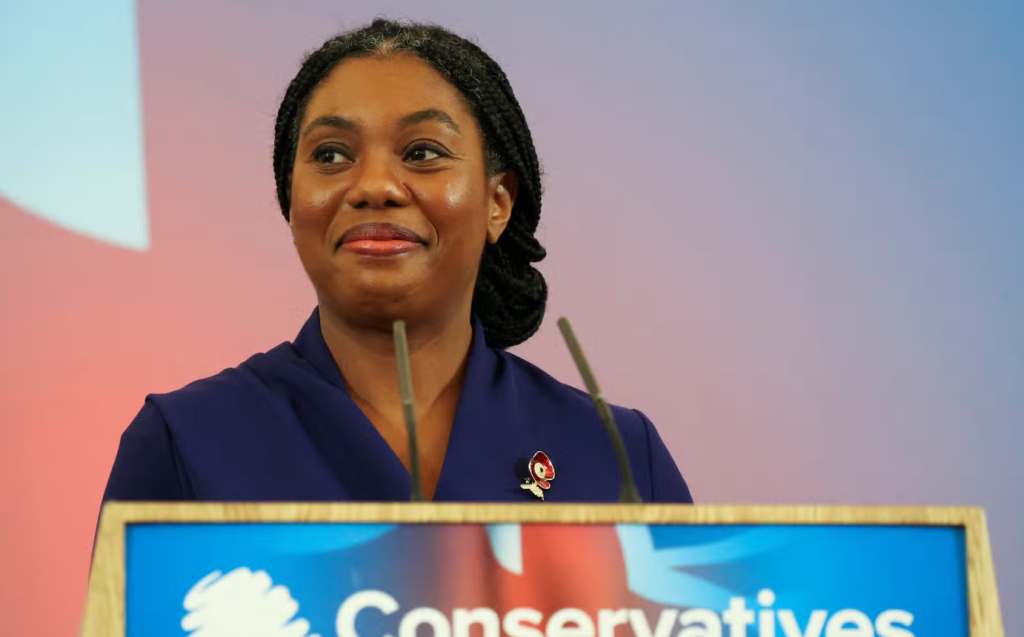
Image credit: The London Standard
Written by Toby Varian, Public Affairs Manager
After an exhausting leadership contest with a surprising number of twists and turns, Kemi Badenoch became the new Leader, and fourth woman to lead the Conservative Party. The former Business Secretary was always the runaway favourite to succeed Rishi Sunak. Her straight-talking, no-nonsense approach proved popular with MPs and members and promised a complete ‘renewal’ of the Conservative Party.
The size of the challenge that Badenoch inherits should not be underestimated. Following a crushing defeat at the General Election in July 2024, the Conservative Party has just 121 MPs and is more fractured than ever. Its supporter base is split between its traditional “One Nation” centre-right base and the alternative right-wing vote, which subscribes to a more Reform UK and Trumpian model of Conservatism.
Badenoch’s victory would suggest the Conservatives are looking to shift to the right, but it remains to be seen whether this will be focused on cultural and social issues, which Kemi has built her brand around, or whether this will mature into a more refined alternative offer of Government. A blunt force approach risks alienating its core support vote who don’t subscribe to the new brand of right-wing politics. It may also struggle to win back voters who voted Conservative in 2019, but may have voted Labour or Liberal Democrat for the first time in 2024.
Badenoch will need to work overtime to try and unite the Party behind her and beat back the major push by parties like Reform UK, who have started to make inroads into the Conservative political heartlands.
Shadow Cabinet appointments
Shortly after her appointment, Badenoch made her first major leadership decision by selecting her Shadow Cabinet ahead of the November recess.
Many of the surviving big names in the Conservative Party, such as Jeremy Hunt MP, Andrew Mitchell MP, James Cleverly MP and Tom Tugendhat MP have returned to the backbenches, which led to a very narrow pool of remaining candidates. This allowed Badenoch to appoint some of her most loyal supporters such as Laura Trott MP (Shadow Education Secretary) and Kevin Hollinrake MP (Shadow Housing Secretary). She also selected key figures from the different factions of the Party, including Mel Stride MP as Shadow Chancellor and Dame Priti Patel MP as Shadow Foreign Secretary.
Her leadership opponent, Robert Jenrick MP, took on a relatively mid-level post in the Shadow team, taking on the Shadow Justice brief. This could be seen as something of a back-handed gesture and, frankly, one that is driven more by a need to fill positions than a desire to bring her rival inside the tent.
Where does she go from here?
Now that a new Leader has been appointed and a meaningful Government Opposition is in place, a bigger question now remains for the Party. How will they cope in Opposition?
This will be a considerable gear shift for the Conservatives after 14 years in Government. They will no longer have the same access, budgets and resources that are traditionally kept for the ruling party of the day. The lack of experience in Opposition will be a significant challenge for the wider team as none of her appointments have any experience in the day-to-day complexities required to keep the Government on their toes. Labour often struggled to manage the process efficiently with 190 MPs in Opposition, doing it with 121 MPs is nearly an impossible task.
Badenoch’s political instincts lean towards headline grabbing, and with the Government likely to absorb most of the political oxygen, her somewhat controversial approach may prove handy when trying to achieve political and media cut-through.
The upcoming local elections in 2025 and London borough elections in 2026 will serve as an important litmus test for Badenoch’s popularity. Whilst it’s commonly acknowledged that ruling parties tend to perform badly in local elections, if Badenoch is unable to reverse the Conservative Party’s years of poor performance at the local elections, leading to more victories for Reform UK, The Green Party and the Liberal Democrats, it could raise serious questions about the viability of her leadership.
What’s in it for Housing?
During her brief stint as Shadow Housing Secretary this year, Badenoch engaged in a series of debates with Angela Rayner MP about Labour’s housing targets, which she believed were naïve and undeliverable. However, over the leadership campaign, she claimed to be pro-housing and recognised the need to build more homes for young families, particularly in high demand areas like London.
At the General election, the Conservatives lack of housing policy and poor track record for delivery lost them vital support among younger voters, with the Conservative vote share in the Under-45 demographic almost wiped out. YIMBY-ism has now picked up momentum in the UK and has strong support among Labour leaders and the new MP cohort. The Conservatives would do well to build a stronger vision of how they’d support the sector to deliver homes in such a challenging economic environment for housebuilding.
The Labour Party have committed to very ambitious pledges on housebuilding targets and Badenoch and her new Housing Secretary are going to need to think about how to approach Labour’s narrative on housing. They will need to strike a balance between supporting the principle whilst criticising Labour’s ability to deliver on these pledges. Their role will also be crucial to closely scrutinise the future Planning and Infrastructure Bill, which is likely to be introduced into Parliament next year.
